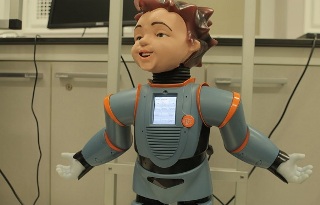Jun 25 2015
The Network will bring together the UK’s core academic capabilities in robotics innovation under national coordination for the first time and encourage academic and industry collaborations that will accelerate the development and adoption of robotics and autonomous systems.
 A Zeno robot at the University of Sheffield
A Zeno robot at the University of Sheffield
The University of Sheffield is one of 12 founding network members, who were unveiled at the Science Museum in London following a public lecture on Robot Ethics, led by Professor Tony Prescott, Director of Sheffield Robotics.
The new network has already received strong support by major industrial partners, the Science Museum and the UK’s major professional engineering bodies including Royal Academy of Engineering, IET, and The Institute of Mechanical Engineers. The Network will expand to include broader stakeholders including key national laboratories in the UK and leading international collaborators in both academia and industry. The global market for service and industrial robots is estimated to reach $59.5 billion by 2020.
University of Sheffield robotics and psychology expert Professor Tony Prescott, who is a co-investigator in the EPSRC RAS Network grant, spoke at the launch about the challenges of developing ethical principles for robots compared to ordinary products, as well as whether a robot might one day have a sense of self.
Speaking of the new network, Professor Prescott said: "It's key for the UK to take the lead in advanced robotic and autonomous systems, rather than simply responding as the world is transformed around us. Sheffield is proud to play a major role in driving forward research in this area, which looks to significantly boost the UK economy and ensure we remain at the forefront of robotics innovation.”
Sheffield Robotics is already leading the way in robotics research, boasting the only lab in the world where you can find an iCub robot with a swarm of 900 Kilobots. World-renowned academics at the University are carrying out a wide range of inter-disciplinary research; from materials handling and manufacturing, cooperative robotics and swarm robotics, to human-robot interactions, robot ethics and design.
The new EPSRC UK-RAS Network is funded by The Engineering and Physical Sciences Research Council (EPSRC) – the UK's main agency for funding research in engineering and the physical sciences.
Commenting on the launch, the UK government’s Minister of State for Universities and Science, Jo Johnson said: "Robotics and autonomous systems have huge growth potential for the UK as one of our Eight Great Technologies. To get it right we need to draw on the expertise of the UK’s research base and the ambition of industry. By working collaboratively, this network will only help to accelerate growth of a high-tech sector and pave the way for new high-value, skilled jobs – a win, win scenario for the UK."
The Network’s mission is to provide academic leadership in Robotics and Autonomous Systems, expand collaboration with industry and integrate and coordinate activities at eight EPSRC-funded RAS dedicated facilities and Centres for Doctoral Training (CDTs) across the UK.
Kedar Pandya, Head of the Engineering Theme for the Engineering and Physical Sciences Research Council, added: "Working with Innovate UK and other research council partners, EPSRC's mission is to support and invest in the world-leading research base that has earned the UK its deserved reputation for research excellence. Robotics and Autonomous Systems are one of the Eight Great Technologies in which the UK is set to be a global leader, and the technology being developed at these EPSRC-funded RAS facilities will deliver a significant impact on the research landscape, and attract the kind of industrial investment that will maximise the UK’s stake in the worldwide robotics market."
The Network will organise a wide range of activities including network and strategic roadmap events such as the UK Robotics conference, symposia and focused workshops, public engagement and exhibitions. It will also have extensive online engagement activities using social media and web and user forums. The Network aims to strengthen the relationship with industry by supporting interdisciplinary mobility and industrial secondment and developing proof-of-concept (PoC) projects and running design challenges. There is also a strong emphasis on government policy and high-level engagement with international stakeholders.